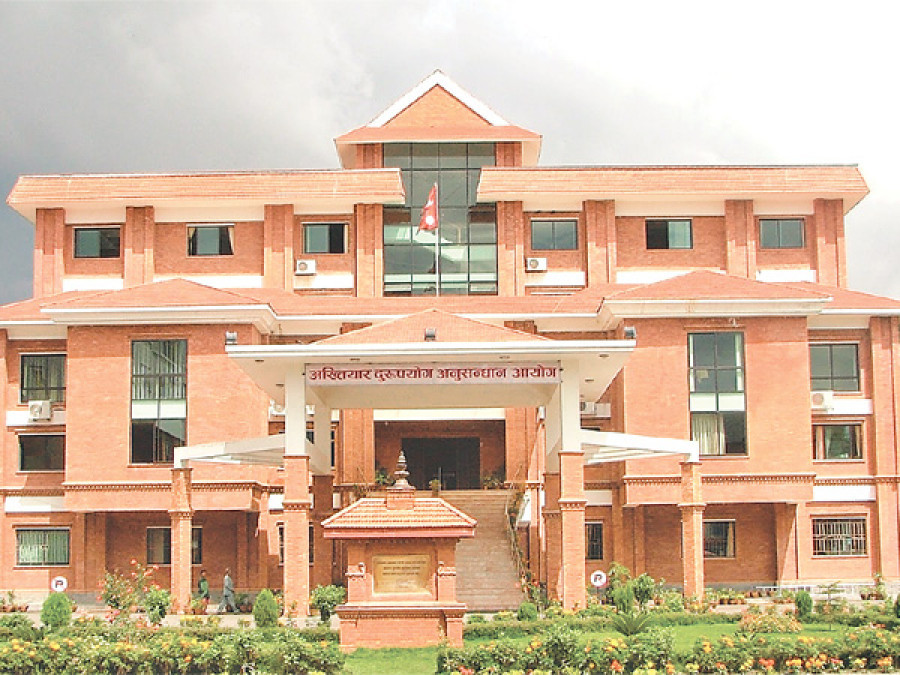National
National Assembly committee to review CIAA bill after protest from private sector
The private sector had lobbied hard with the senior leaders of ruling and opposition parties to stop the bill.
Prithvi Man Shrestha
The bill committee of the National Assembly will review the contentious provisions of the amendment bill to Commission for Investigation of Abuse of Authority Act after strong protests from the private sector and the main opposition, Nepali Congress.
A number of provisions in the bill, including allowing the anti-graft body to investigate corruption in the private sector, has courted controversy, as many suspect that the provision could result in a witch-hunt against private individuals and institutions.
“President [of the National Assembly] has asked us to relook into some contentious provisions, see if anything could be reconsidered,” Parshuram Meghi Gurung, chairperson of the committee, told the Post. “We will hold informal discussion on the issue among the cross-party lawmakers and make recommendations to the Lower House.”
Earlier, the committee had endorsed the amendment bill and submitted it to the National Assembly for endorsement from the full house.
The government was planning to endorse the bill from the Upper House on Tuesday, but it was removed from the agenda at the last hour after the Nepali Congress sought more time for discussion.
According to Gurung, the bill has not been returned to the committee. “We can make minor adjustments to the bill at the Upper House itself. The bill committee will make its recommendations which will be adjusted there,” he said.
The private sector had strongly lobbied against the endorsement of the bill in its current form, saying it would discourage the investment climate.
“We had approached almost all top leadership of the ruling and the opposition parties, including Prime Minister KP Sharma Oli, Nepal Communist Party Co-Chairperson Pushpa Kamal Dahal and Nepali Congress President Sher Bahadur Deuba,” a private sector leader said on condition of anonymity because of sensitivity of the matter. “All of them had assured us that the bill would be withdrawn from the Upper House.”
Amid widespread concern over the bill, a Standing Committee meeting of the ruling Nepal Communist Party on Wednesday had also decided to put the bill on hold.
“The bill will be forwarded for endorsement only after further discussions among the parties,” NCP General Secretary Bishnu Poudel had told the Post on Wednesday.
People representing the private sector have strong reservations on the provision of the bill that brings the sector under the purview of the anti-graft body. They say the provision affords a leeway for the commission officials to misuse their power for personal gains.
However, the Commission for Investigation of Abuse of Authority (CIAA) has been arguing that the private sector should be brought under its jurisdiction since Nepal has endorsed the United Nations Convention against Corruption.
According to the amendment bill, insurance companies, medical colleges and related hospitals, universities and colleges, public limited companies and projects run by domestic and foreign institutions that receive funding from any of the three layers of government will come under the commission’s jurisdiction.
In a joint press statement on Wednesday, the Federation of Nepalese Chambers of Commerce and Industry and the Confederation of Nepalese Industries, two key private sector bodies, said that bill would ruin the investment climate in the country at a time when the country is facing economic crisis due to the Covid-19 pandemic.
“The provision of the bill will intervene on professional freedom of the private sector companies,” the statement reads. “ Instead of making an effort to make the economy run well, the introduction of such a bill will encourage people to desert their businesses.”
Legal experts have also raised concern that the government giving up the role of monitoring and regulating the private sector could lead the transfer of executive power of the state from the elected government to an unelected body like the CIAA.
Radheshyam Adhikari, a Congress lawmaker at the National Assembly and a lawyer, had told the Post earlier this week that the commission would be in the driving seat in regulating the private sector instead of the government agencies if the bill is endorsed.
Furthermore, he said the bill also allows the CIAA to stop the works of development projects if it considers that there has been corruption. “It will make the government employees accountable to the commission instead of the higher authority of the government including ministers,” Adhikari said.




 9.89°C Kathmandu
9.89°C Kathmandu














